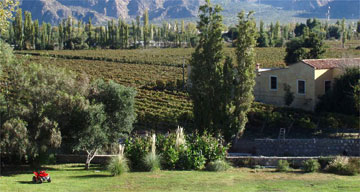
Colomé's fame spreads far beyond its remote location. As I travelled from the colonial city of Salta up through a dramatic gorge in deep green velvet mountains, I heard rumours that a Swiss wine maker, Don Hess, had paid $1 million for a vineyard there and was planning to make the world's highest altitude wine as well as establishing a stylish hideaway hotel. It all sounded rather unlikely. Then someone whispered conspiratorially, "It's preciosa" - the adjective reserved only for the most gorgeous places.
Colomé is hidden away in the Valles Calchaquíes in northwest Argentina, high up in the foothills of the Andes, and four hours' drive from Salta. Just a few tranquil villages, goats, maize and neat adobe houses. Here and there, a flag of scarlet on a distant slope: a whole field of peppers laid out to dry. It's beautiful, but not the kind of place you'd choose to grow world class wines.
But Hess must know better. He has three wineries already, in California, South Africa and Australia, though none of them are high altitude. So when he discovered the Calchaquí valley, he experimented first with malbec and cabernet sauvignon vines at 8,200ft above sea level, and then he tried out six different grapes, including pinot noir and tempranillo at a staggering 9,891ft. Colomé was already planted with vineyards when he bought it, and here Hess found he had incredible treasure: rare pre-phylloxera French malbec and cabernet sauvignon vines.
The whole estate is self-sufficient for energy: an ingenious hydro-electric system supplies both the hotel and the winery with electricity without any environmental impact. The old vineyards are watered with the traditional gravity water flooding system, which the indigenous people have been practising here for centuries.
Sheep and cattle produce both organic meat and milk, and manure to feed the vines and organic kitchen garden, so the entire estate is self-sufficient for food, too. People are also part of the system. When Hess bought the land, he took on responsibility for its 400 inhabitants, who had been coerced into slave labour for the previous feudal owner. Colomé now employs at least one person in each extended family, so that the income flowing into the community is fairly distributed. Hess trains them, pays their health insurance, and has built a community centre, clinic and church - though it's the cable TV they're really grateful for: football, after all, is the real religion here.
The same care and interest is shown to the estate's guests. It's the last place you'd expect to find a smart hotel, but here, at the foot of the mountains, and surrounded by vineyards, there's a traditional estancia, with nine welcoming rooms arranged around a calm central courtyard.
Donald and Ursula Hess are friendly, down to earth and warmly curious about their guests, the nicest millionaires I've ever had lunch with. And the food is superb: fine steaks, as you'd expect in Argentina, but also exquisite concoctions made from regional delicacies, such as hand-made ravioli filled with goats' cheese, and a parfait of strawberries grown on the finca.
Being at Colomé is like visiting another planet: it takes a day or so to adjust to the silence, and the immense space. With a week here, you could completely unwind and still wouldn't exhaust the walks and trails to ride.
· Suites $225 per night (stay four nights for the price of three): 0054 3868 49 4044, Estanciacolome.com. Oddbins (Oddbins.com) sells Colomé Estate 2004 (details at Bodegacolome.com) for £12.99.
· Footprint Argentina by Christabelle Dilks costs £14.99.

